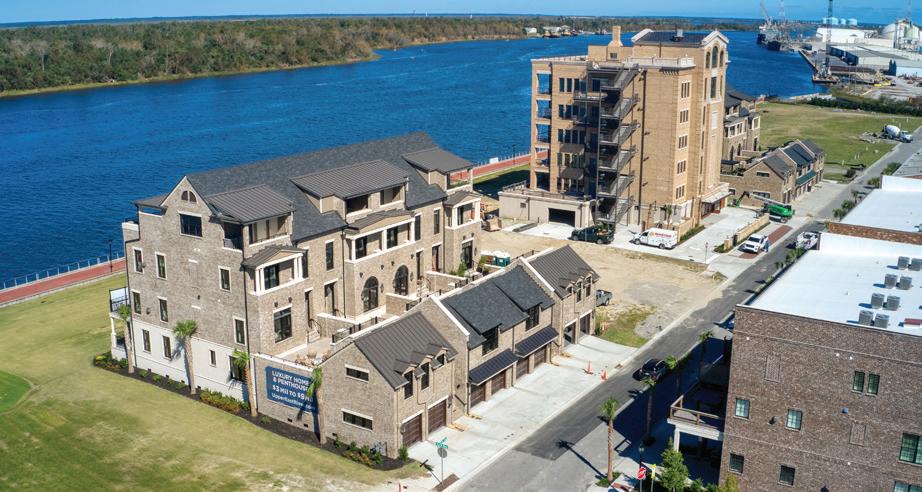

Atlanta Intown












Editorial
Collin Kelley
Executive Editor
Beth McKibben
Editor-in-Chief
Sr. Editor Food & Dining
Cathy Cobbs
Managing Editor, Reporter Newspapers
Sammie Purcell
Associate Editor
Staff Writers
Katie Burkholder, Bob Pepalis, Logan C. Ritchie, Sarra Sedghi, Stephanie Toone
Contributors
Amanda Andrews, Sally Bethea, Haile Irving, Sherri Daye Scott



Published By
Rough Draft Atlanta
Keith Pepper
Publisher
keith@RoughDraft.news
Neal Maziar
Chief Revenue Officer neal@RoughDraft.news
Rico Figliolini
Creative Director
Circulation
Each month, 27,000 copies of Atlanta Intown are mailed to homes and distributed to businesses in and around ZIP codes 30306, 30307, 30308, 30309, 30324 and 30329. For delivery information, delivery@RoughDraft.news
To subscribe to home delivery, ($125 / year) email delivery@RoughDraft.news
Advertising sales@RoughDraft.news
Deborah Davis
Account Manager | Sales Operations deborah@RoughDraft.news
Jeff Kremer
Sr. Account Manager jeff@RoughDraft.news
Suzanne Purcell Sr. Account Manager suzanne@RoughDraft.news
Operations Savannah Pierce savannah@RoughDraft.news

About the Cover
Cirque du Soleil is bringing its big top back to Atlantic Station this month for “Luzia,” which is just one of the many holiday events happening around the city in November. Check out our Holiday Happenings guide on page 14. (Photo by Matt Beard)


EDITOR'S NOTE




Here’s a sentence I never thought I’d type: I’m awaiting bank approval of a home equity loan.
EDITOR'S NOTE
As I’ve mentioned before in this column, I never planned to be a homeowner, but now I’m taking out loans, consolidating debt, and doing minor renovations. I’ve never felt more like an adult in my life.

After my condo was damaged by a sprinkler flood last year, new hardwood floors were installed, and I still marvel at how gorgeous they are. But that forced renovation has had me sideeying my bathroom counter situation for months. It’s not a crazy, expensive upgrade. but it will make my morning and evening beauty routine (Ha!) more convenient and aesthetic.
Although money’s too tight to mention these days for most folks, I still believe in the power of retail therapy to get you through a troubling time. And just a glance at the news is enough to have me

reaching for the credit card.
On top of that, I was back at Emory Hospital for my now yearly CT scan to make sure the cancer hasn’t returned. I’m happy to report that I’m still in the clear, but the whole process will never not be nerve-wracking.
In mid-October, I joined the Rough Draft and Georgia Voice staff for the Atlanta Pride celebration in Piedmont Park. I spent many hours at our booth and was fortunate to meet so many loyal readers and sign up a few new ones for our newsletters.
You might have spotted me waving and snapping my rainbow flag fan from the passenger seat of a silver convertible (thank you, Mercedes-Benz of Buckhead!). It was amazing to see the thousands of folks
lining Peachtree Street in solidarity with the LGBTQ+ community.
Right after the parade ended, someone whispered to me that Diane Keaton had died. It was an instant pang to my heart. I’ve been a fan since “The Godfather” and “Annie Hall” and she’s one of the few actors where I’ve literally seen every movie they ever made – even the whackadoodle stuff (“Poms,” “Arthur’s Whiskey”... anyone?) from her late career. Her death, back-to-back with Robert Redford’s, has had me in my feels for weeks.
As many of you know, I’m a poet in my other life, and it’s how I express myself best. So, allow me to be self-indulgent and share this one with you. I know so many of you loved her, too, judging from the outpouring on social media.
Goodnight, stardust.
Bowling with Diane Keaton Friday night, 80s halcyon, a memory of October bowling. The suburban lanes loud with kids and kinetic release of balls slamming on maple.
I have no footwork, no sense of release, fingers sweaty in the grips, resin dropping with a hollow boom followed by derision from more adept friends.
I remember reading about bowler superstitions: Lucky shoes, towels, and socks or prayers and chants. We’d just seen “Baby Boom” –executive Diane Keaton saddled with unexpected baby altering her corporate ambitions –and since Diane has been good in everything forever, I chose her.
On every approach, perfecting my four-step, under my breath –Diane Keaton, Diane Keaton, Diane Keaton –and the ball lightens, rolls straight, connects dead center on the headpin, then it's strike after strike all night.
Four decades flown, and I don’t bowl often, but Diane is still the mantra. And when she dies, I find myself In the supermarket aisle, doctor’s office, subway, watching hellish newscasts –Diane Keaton, Diane Keaton, Diane Keaton. A charm against the inconceivable, the bowling gods giving and taking away, another cursed split in a year full of gutters.
Collin Kelley
Diane Keaton (via Wikipedia)











Input gathered for Memorial Drive Greenway amenities
By Collin Kelley
An open house on Oct. 14 at the Oakland Cemetery Visitor’s Center offered attendees the opportunity to share their interest levels on proposed amenities for the Memorial Drive Greenway.
The linear park, which will stretch from the historic cemetery to the Downtown Connector, has been floating around for more than 50 years, but is now poised to break ground in Fall 2026.
Representatives said the greenway is
being built on principles first detailed in a 2016 vision plan. Representatives from Pond & Company, the engineering firm that will guide construction, said the neighborhoods around the park have changed significantly in the past decade and new input was needed from residents and stakeholders.
The greenway will be broken into six block segments, located between existing roadways, including Martin Street, Connally Street, Moore Street, Hill Street,


Fort Street, and Grant Street.
Each segment currently has a theme: Celebrate, Move, Explore, Gather, Play, and Reflect. The first segment to break ground next year will be the Move segment, which will include a skatepark designed by Canadian firm New Line Skateparks, a roller skating plaza, and an all-wheel pump track.
Visitors to the open house were asked to place small stickers on elements they’d like to see in the other segments. For example, in the Explore block, there is potential for a large children’s play area, while the Celebrate block could have an
amphitheater or stage area.
The Atlanta Preservation Center has weighed in on naming the park after late restaurateur Ria Pell, whose Ria’s Bluebird remains a beloved brunch spot and was a catalyst for reviving the bustling Memorial Drive corridor.
The greenway is being made possible by a coalition of partners, including the City of Atlanta, Pond & Company, Mailchimp co-founder Dan Kurzius, The Integral Group, Park Pride, the Friends of Memorial Drive Greenway, and The Conservation Fund.

A poster displays renderings of the upcoming skatepark at the Memorial Drive Greenway. (Photo by Jacob Nguyen)
This poster shows the Memorial Drive Greenway’s themed sections with active and passive recreation spots. (Photo by Jacob Nguyen)







Dr. Norman Sauce has been named acting superintendent of DeKalb County Schools after Superintendent Devon Horton resigned following a federal indictment on fraud charges for acts allegedly committed while he was serving as a superintendent in Illinois.
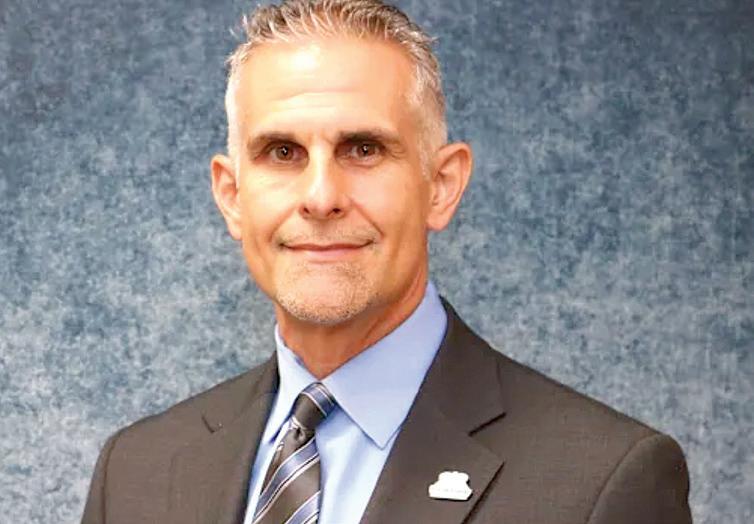
More than 10,000 rallied at the Atlanta Civic Center, then marched to the State Capitol on Oct. 18 as part of the “No Kings” protests that drew millions to demonstrations across the nation.
Months after admitting to violating campaign finance laws, the New Georgia Project and New Georgia Project Action Fund will be officially dissolved. The state ethics commission fined the organization $300,000.
Be sure to visit RoughDraft.news on Nov. 4 for the results of the Atlanta municipal elections and the Georgia Public Service Commission.
Proposed Atlanta TAD extension sparks hours of discussion at city hall
By Amanda Andrews | GPB News
Atlanta City Council’s Community Development Committee will take more time to consider a proposal to extend Atlanta’s Tax Allocation Districts for 30 years. A meeting on Tuesday, Oct. 14 drew hours of discussion from supporters and people with concerns.
Extending the TADs is a priority for Mayor Andre Dickens to accomplish his recently announced Neighborhood Reinvestment Plan. The project will invest in affordable housing, public
safety, greenspaces, health and wellness, particularly in neighborhoods that haven’t received city funding historically.
Atlanta Chief of Staff Courtney English said development can’t be left up to market forces.
“If we let the market do it, 100% guarantee that folks in these neighborhoods will be displaced, or they will we will continue that vicious cycle of disinvestment that has a negative impact on folks citywide,” he said. “Or we can make a different choice. We can leverage
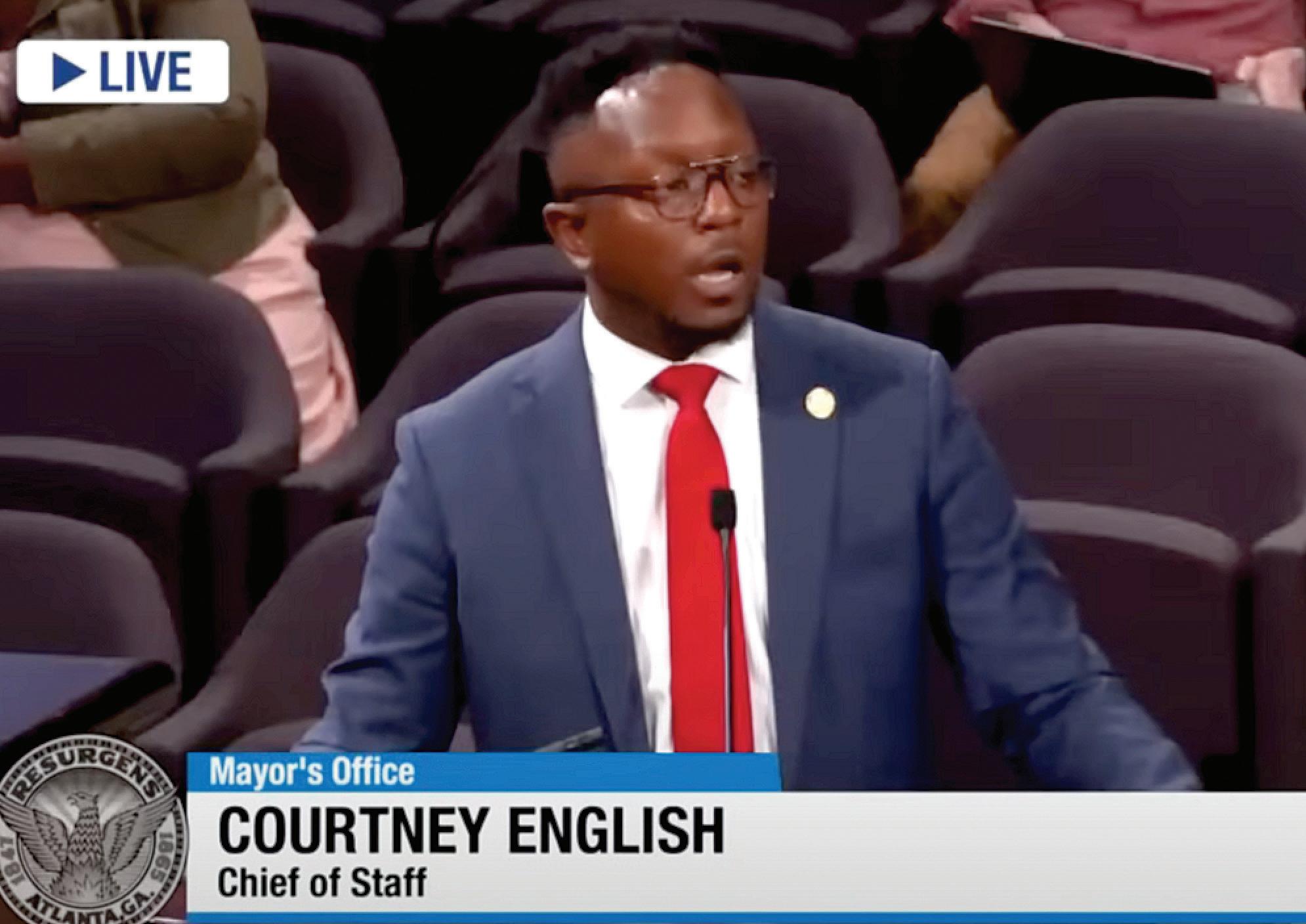


tools like TADs and work alongside communities to accomplish community goals.”
The bonds work by allowing the city to take a loan against the future property value of housing in the district. The TAD areas include the Beltline, Perry-Bolton, Hollowell/MLK, Eastside, Westside, Stadium, Campbellton, and Metropolitan. All of them are set to expire within the next five to 13 years.
Projects like the Beltline and Atlantic Station were partly funded using TAD money. English said the city is drafting a new list of projects based on community input.
“Almost $1.4 billion for affordable housing projects, both single and multifamily,” English said. “$170 million that can support health centers, recreation, and continued grocery stores. $88 million reserved for small business.”
The city has identified $5.1 billion worth of projects out of the $8 billion expected to be raised by 2055. The projects include:
■ $1.9 billion for expanded transit networks
■ $1.5 billion in trails and greenspace
■ $1.3 billion in affordable housing
projects both single and multi-family
■ $170 million supporting health centers, recreation and grocery
■ $88 million reserved for small business and commercial development
■ $81 million in public infrastructure
Critics raised questions about how the city will persuade Fulton County and the Atlanta School Board to sign on to the extension and who will oversee the spending.
Neighborhood Planning Unit J Chair Anissa Ferrell voiced her concerns about the TADs during public comment.
“While the TAD has always been the most powerful redevelopment tool in our city history, making investment opportunities available, creating jobs and improving infrastructure,” she said,“it is time that we reevaluate how these districts are redesigned, govern and measures to ensure the remaining equitable and effective for all Atlantans.”
City Council Community Development and Human Services committee will meet again on Oct. 28. Collin Kelley contributed to this story.
Atlanta’s Favorite Real Estate Team




During these uncertain times, HammerSmith is here for you and your family. We provide safe, essential services, architectural designs and home renovations. Start planning today for how to live better in a changed world. HammerSmith is here for you and your family. We provide exceptional architectural designs and home renovations. Start planning today for how to live better in an ever-changing world.

APS to hold first reading of controversial long-range plan
By Collin Kelley
The Atlanta Board of Education is expected to host a first reading of a longrange plan that could include school closures, consolidations, expansions, and redistricting.
The meeting is set for Nov. 5 from 6 to 7 p.m. at Atlanta Public Schools’ Center for Learning and Leadership (CLL), 130 Trinity Ave. SW.
In early October, APS released a series of “refined scenarios” for its long-range plan, APS Forward 2040.
According to the press release, these refined scenarios are the “product of data, analysis, and thousands of voices from our community.”
“They reflect the district’s ongoing effort to balance enrollment, expand access to academic programs, and reinvest in schools that have historically been overlooked,” the press release said.

Some of the proposals in the refined scenarios include:
■ Repurpose KIPP Soul Primary.
■ Combine Finch Elementary and Perkerson Elementary at a converted Sylvan Hills Middle School facility.
■ Perkerson, Finch, and Gideons Elementary Schools would join the Washington Cluster.
■ Slater Elementary and Price Middle School proposed to join the South Atlanta Cluster.
■ Hollis Innovation Academy proposed to remain a K–8 school instead of converting to K–5.
■ School of the Arts at Carver campus would expand to become a 6–12 district-wide school with preference given to students in the current Carver Cluster.
■ Carver Early College would become 9-12 district-wide school with preference given to students in the current Carver Cluster.
Many parents pushed back on the initial scenarios, even forming community groups to organize against the long-range plans. The press release from APS said “nothing is final” as it continues to collect public feedback.
“Scenarios will continue to change and evolve as APS listens to families and communities before making any recommendations to the Board of Education as a first read in November,” the press release said.
APS said it has received over 7,000 survey responses, collected hours of community feedback, and received comments through the website.
The scenarios and other materials are available at atlantapublicschools.us/aps2040.

Seeking nominations of students for our 17th Annual 20 Under 20 issue.
Here’s the information we need:
■ Nominator (name, relationship to nominee and contact information)
■ Nominee (Name, age, grade, school, parent or guardian names, contact information)
■ Characteristics and service: Please provide a paragraph describing why this nominee deserves recognition. Include service projects, goals, and areas of interest.
■ A high resolution photograph (1MB in size or more) of the student in any setting.












‘Digital gold rush’ threatens air, land, and water
By Sally Bethea
ABOVE THE WATER LINE
My daughter-in-law, Meredith, is practical and patient. She’s my goto person for the things I can’t figure out how to do, of which there are a growing number. Among dozens of other tasks, she’s shown me how to open my grandson’s baby stroller, operate my wireless music speaker, and inflate my camping pad. Most of all, I rely on Meredith to help me with the electronic technology that baffles and frustrates me on a regular basis.

When I decided to write about the proliferation of data centers in metro Atlanta, Meredith suggested (ironically, as she noted) that I check out ChatGPT—the artificial intelligence (AI) chatbot that you can “talk to,” as though it were another person. It generates “human-like” text and can answer questions about virtually any topic. It can also generate incorrect responses, or “hallucinations.” There are biases in the human-created system as well. Critical thinking is essential.
With Meredith’s assistance, I opened the ChatGPT App and asked my question. What should I include in a story about data centers: the buildings filled with equipment to process internet traffic, facilitate AI, and store massive amounts of digital data? The answer wasn’t revolutionary, but I received a useful outline in a nanosecond. (Notably, a ChatGPT query consumes about five times more electricity than a simple web search.)
An admission: I am addicted to Googling various subjects on my smartphone. The digital world of the internet is a great improvement over the Ouija boards and Magic 8-Balls of my teenage years in the 1960s—again, as long as critical thinking is employed. Dozens of times each day, I ask my phone random questions that pop into my ADHD-addled brain. Until recently, however, I had not thought about the cost of my queries—in terms of energy, water use, and community impact.
Like millions of other people, I’ve used the “magic” of the internet, assuming that its infrastructure

was located somewhere else. That “somewhere else” is now Georgia, with the explosion of proposed data centers. The environmental impacts, lack of government oversight, and corporate secrecy are alarming.
Hot Market for Data Centers
Once the booming epicenter of the South’s railroad network, Atlanta is again a crossroads for huge financial investment and development—this time related to the digital industry. According to an excellent series in the Atlanta Journal-Constitution, the region is the country’s hottest data center market, “playing host to a digital gold rush by tech giants, real estate speculators, and private equity firms.” There appear to be about 100 existing centers and several dozen proposed locations—primarily in the Atlanta region—but no one knows for sure.
Atlanta’s expansive fiber optic infrastructure offers a solid backbone for data centers, coupled with available land, inexpensive water supplies, and an electric utility (Georgia Power) salivating at the thought of new business. State and local officials are providing hundreds of millions of taxpayer dollars as incentives to attract developers, despite the highly speculative nature of the AI boom.
Business analysts are already comparing the rapacious industry growth to the infamous dot-com bubble of the late 1990s—when a similar speculative frenzy and overvaluation resulted in a plunge in stock values and bankruptcies. They also note that the
How will a community cope with the data center projects that inevitably go bust—after land is cleared (and starts to erode); after the power grid expands with more polluting coal and gas plants (and rates increase for all customers); and after permits have been issued for withdrawals from limited water sources? In metro Atlanta, water supplies are highly vulnerable to droughts. In fact, we’re in a severe drought now. Importantly, a significant amount of the water used to cool most data facilities is consumed through evaporation; it is not returned to its source, thereby depleting downstream flows.
U.S. economy is being bolstered by the extraordinary boom in AI: a precarious situation.
At What Cost
The deluge of data centers may place metro Atlanta in the vanguard of the next technological revolution—but at what cost? One large data center can demand as much power and water as a small city. Will the resources allocated to centers preclude future local development? Will electricity and water rates increase for all customers? If water is rationed during droughts, will the centers have priority over other water users? Critically, none of these questions, and many more, have been answered.
There are few government guardrails. No state office is charged with identifying all the proposed centers. There are no regulations to require tracking of their power and water use. Several state legislators are working on laws to protect communities and the environment, as the AI boom accelerates; however, their efforts have been rebuffed by lobbyists for Big Tech and Big Power.
Local governments are rezoning sites for industrial use that are hundreds of acres in size—some a thousand acres— with minimal information about data center needs. The speculators promoting these hyperscale projects refuse (or are unable) to divulge details about their electricity and water requirements. Why the secrecy, if these projects are harmless, cash-cow opportunities for communities?
Data center proposals across metro Atlanta have faced protests and packed local meetings—as residents rightfully fear their “community wealth” will be seized for corporate profits. From the city of Atlanta to small communities in the metro region and statewide, people are demanding answers and successfully securing moratoriums and bans on the centers.
Minimizing Harm
There is little doubt that more data centers are needed to power digital services. While I’m not planning to stop my daily Google searches, I am thinking more about my personal digital footprint. The question—and it’s a really important one—is whether or not state and local officials are going to take any actions to protect citizens and natural resources from exploitation by the speculative AI industry.
Data center development must be tracked to understand the cumulative impact of these facilities. Actual water and power use information must be collected. These metrics must be made available to the public. Developers must fund their own installations, rather than relying on taxpayer or ratepayer support. Alternative power and water sources must be considered, e.g. reuse wastewater and rainwater for cooling, efficient “waterless” closed-loop cooling systems, and renewable energy sources.
On Nov. 4, citizens have the opportunity to elect two new members of the Georgia Public Service Commission (psc.ga.gov), which regulates electric utility rates and services, including data centers. Read about the candidates by searching Public Service Commission at RoughDraft.news, then vote!
Sally Bethea
Via Adobe Stock









ARTS & ENTERTAINMENT


The holiday season will be in full swing starting this month with concerts, plays, opera, visits with Santa, illuminated landscapes and aerial theatrics under the big top.
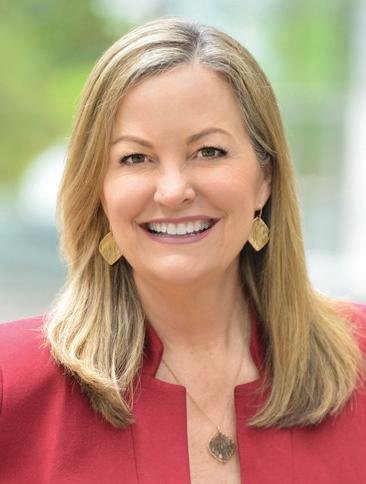

The big striped tent will return to Atlantic Sation Nov. 6 to Dec. 14 as Cirque du Soleil presents “Luzia.” This aerial acrobatic performance chronicles the encounters of a traveler who parachutes
into a dreamlike version of Mexico and meets a mystifying menagerie of characters along the way. Get tickets at cirquedusoleil.com.
Garden
Lights, Holiday Nights
The Atlanta Botanical Garden is hosting the 15th annual “Garden Lights, Holiday Nights” Nov. 15 to Jan. 11. The grounds will be illuminated with thousands of lights, while the tree sculptures from this summer’s “Enchanted Trees by Poetic Kinetics” will be incorporated into the




By Collin Kelley
Cirque du Soleil: Luzia
Garden Lights, Holiday Nights (Courtesy Atlanta Botanical Garden)
Cirque du Soleil: Luzia (Photo by Matt Beard)

show. Tickets usually sell out fast, so get yours at atlantabg.org.
Light Up the Season at Piedmont Park
The Piedmont Park Conservancy will host this special event on Sunday, Nov. 23, from 6 to 7:30 p.m. in The Meadow as the park's Great Tree, Menorah, and Kinara are illuminated. The event also encourages guests to donate food, books, and pajamas to support local families in need. Get more information at piedmontpark.org.
Center for Puppetry Arts
“Rudolph the Red-Nosed Reindeer” soars back into the Midtown venue from Nov. 12 to Dec. 28 with a puppet version of the classic stop-motion animation TV special from 1964. Tickets, which also include a create-a-puppet workshop, can be purchased at puppet.org.
Atlanta Shakespeare Company
If you’ve been grooving to Taylor Swift’s hit single, “The Fate of Ophelia,” Atlanta Shakespeare Company is offering an opportunity to see where the literary reference originated – The Bard’s “Hamlet” – Nov. 8-30 at Shakespeare Tavern. Tickets available at shakespearetavern.com.
Fox Theatre
The Fox Theatre is hosting its second annual Foxgiving Feast on Nov. 20 – a chef-curated, Thanksgiving-inspired menu
and complimentary wine and sherry tastings from Olé & Obrigado. And if “Luzia” isn’t enough Cirque du Soleil for you, the one-night only “Magical Cirque Christmas” hits the Fox stage on Nov. 23. Tickets for both events are available at foxtheatre.org.
Atlanta
Opera
The company is hosting a one-night screening of Jean Cocteau’s “La Belle et La Bete” with the soundtrack replaced by an opera score created by Philip Glass on Nov. 15 and will stage Verdi’s classic “La Traviata” Nov. 8-16 – both at the Cobb Energy Centre. Tickets at atlantaopera.org.
Santa at Rhodes Hall
The Georgia Trust for Historic Preservation will be hosting Santa at historic Rhodes Hall in Midtown from Nov. 22 to Dec. 14. Tickets are $60 and include a photo with Santa. Reservations are already filling up fast! Make yours at georgiatrust.org.
“A Christmas Carol” at Alliance Theater
The classic stage production of Charles Dickens’s “A Christmas Carol” runs Nov. 14 to Dec. 24 on the Coca-Cola Stage. Tickets start at $31 at alliancetheatre.org.

Atlanta Christkindl Market
Experience a hybrid modern-day Christmas celebration and German festivities as the annual market moves to the Lawrenceville Lawn from Nov. 28 to Dec. 24. There are handcrafted goods, entertainment, food and more. Admission is free, and more information can be found at christkindlmarket.org.
Callanwolde Fine Arts Center’s Winter House
From Nov. 29 to Dec. 14, Callanwolde will feature an artist market, live music, historic tours, photos with Santa, and more holiday activities. A dozen holiday


ILLUMINIGHTS at Zoo Atlanta
Hundreds of wildlife-inspired lanterns will decorate Zoo Atlanta for its annual holiday light display Nov. 21 to Jan. 16. Tickets do sell out, so reserve in advance at zooatlanta. org.

Fernbank Museum
WildWoods: AGLOW returns Nov. 14 to Feb. 28 with a nighttime, multi-sensory immersion in the forest around the museum with interactive tulip poplar pod, projections of nocturnal wildlife, glowing native plant species, larger-thanlife incandescent mushrooms and more. Tickets available at fernbankmuseum.org.
art workshops will be offered, including ornament and wreath making. Get more details at callanwolde.org/winterhouse.
Christmas with the Atlanta Symphony Orchestra
The ASO is kicking off the holidays with a live stage version of “A Charlie Brown Christmas” on Nov. 23 and singer Cody Fry gives a holiday concert on Nov. 25. Even more is planned in December with the “Deck the Halls” family concert (Dec. 7), Christmas with Trisha Yearwood (Dec. 10), and Christmas with the ASO (Dec. 11-14). Get tickets and information at aso.org.













Rudolph the Red-Nosed Reindeer (Courtesy Center for Puppetry Arts)
Santa at Rhodes Hall (Courtesy Georgia Trust)
Illuminights (Courtesy Zoo Atlanta)





















































Georgia Tech and Goat Farm preview LOOP
By Sherri Daye Scott
Next spring, Goat Farm will power LOOP, a seven-acre arts and technology project at historic 665 Marietta St. Developed with Georgia Tech Arts, the West Midtown site will mix artist studios, performance spaces, and tech-infused installations just steps from the Ferst Center For The Arts and Science Square, with doors open to both campus and city.
For Georgia Tech Arts strategist Birney Robert, LOOP reflects a larger goal years in the making: helping Georgia Tech play a bigger role in Georgia’s creative industries. The university has launched new degree programs that unite art, design, and technology; explored ways to transform campus-owned sites into creative spaces; and met with community partners to ensure those spaces serve Atlanta’s broader arts scene. Together, those efforts revealed a shared need: a place where creative research can move beyond campus and connect directly with the public.
“LOOP is a great opportunity to bring research outside of the lab and classroom and into a space that’s more accessible,” Robert says. “We want faculty, staff, and students to know this is where they can bring projects to life and where the surrounding community can encounter them.”
LOOP also aligns with Georgia Tech’s vision for the Creative Quarter, a planned innovation district that will connect the campus, Science Square, and the surrounding Westside into a hub for arts, design, and emerging technologies. The activation at 665 Marietta serves as an early test site for what that district could become: a place where creative industries, researchers, and local artists share ideas and space. The project also brings together a varied group of collaborators, including MALL//STAYNER Architects (lead design partner), Anava Projects (international arts consulting), JJLA (live-event production), and Asha Advisory (local partnerships).
Allie Bashuk of Goat Farm describes the partnership as a natural next step in a relationship that has grown organically between the arts center and Georgia Tech faculty and students. “We’ve always had this beautiful back-and-forth,” she says. “At our core, we’re an arts organization,
but we’re also developers. We take a portion of top-line revenue and put it into the Goat Farm Arts Fund, which lets us back dance, theater, concerts, exhibitions—you name it.” Bashuk says LOOP will help the Goat Farm grow and give experimental work room to breathe.
Work on 665 Marietta, formerly known as the Randall Brothers building, will transform its industrial interior into geometric “loops” and flexible layouts designed for quick transitions, from immersive installations to live performances. The space also gives Goat Farm a second significant programming footprint beyond its West Midtown campus, with studios available for lease and a venue designed for creative risktaking. “Leasing the studios is one metric,” Bashuk says. “But equally important is whether contemporary, experimental programming draws interest and whether the name LOOP becomes a real signal in the city.”
Robert measures success the same way: by participation and impact. “The metric is: Do campus makers use the space? Can a researcher translate work for general audiences, stakeholders, and neighbors? If the answer’s yes, LOOP is doing its job.”
Robert says the project provides startups and artists with a test bed while creating a space for Atlanta’s creative community to gather and build. Bashuk calls it a “middle space” between a university and an arts developer— public meets private, lab meets stage, student meets producer. “It’s a powerful collaboration,” she says. “We want to put that on a world stage.”
There’s also a practical goal: make it easier for the public to engage with Tech. “Universities can feel like ivory towers,” Robert says. “Parking is tricky; buildings are hard to navigate. This Westside location makes it easier for people who don’t often visit Georgia Tech to attend events and to see Tech’s creative life up close.”
As construction continues, LOOP is already shaping how Atlanta imagines the future of art and innovation. It’s a working sketch of what happens when research steps out of the lab, artists move into the room, and a city built on reinvention gives them both a stage.

A rendering of LOOP.











How phone bans are changing Atlanta Public Schools
By Haile Irving
EDITOR’s NOTE: This story is a partnership with VOX ATL, a youth-led nonprofit media organization that prepares teens for life, career, and community by harnessing the power of youth voice and uncensored self-expression. Find out more at voxatl.org.
At the end of July, two weeks before school started, students at Maynard Jackson High School were informed that an updated school policy had banned the use of phones, specifically during school hours. The students were told that this was not just a school policy, but a district policy supported by the superintendent. The students were upset about this seemingly spontaneous ban on devices crucial to everyone’s daily lives.
Gwen Montgomery, a sophomore at Maynard Jackson, has numerous concerns about the policy, particularly the provision that allows schools to fine students $50 for using their phones during a test. She says, “The policy is outdated and designed for wealthier schools whose students could pay the $50 and won’t experience the same pressures as those in underprivileged schools… without proper support and alternatives,

this policy can disproportionately affect marginalized students and those without formal accommodations.“ She also believes that students who don’t have specialized education plans, such as Individualized Education Programs (IEPs) or 504 plans, but still require accommodations, will be disproportionately affected. “I’m also worried about the impact on students who rely on personal devices like noisecanceling headphones or note-taking apps to support their learning.”
The New York Times says that cellphones, text messages, and even “nomophobia” — the fear of not having access to one’s phone — can distract students and impair learning.” Cell phones have also been both a distraction and a tool for cheating. In 2017, a survey by McAfee found that 47% of students had seen or heard of another student cheating. Teachers like those at Maynard Jackson agree that this percentage has likely increased in recent years. Also, the National Center for Education Statistics Commissioner, Peggy Carr, says that 53% of “school leaders" reported negative impacts on students’ mental health and academic performance from cell phone use.
Superintendent Dr. Bryan Johnson is a fan of the phone ban in schools. The
CALLING ALL GEORGIA TEENS! JOIN THE CONVERSATION
VOX ATL is partnering with the Georgia Department of Behavioral

plan is to reinforce the “Personal Electronic Device (PED) policy for all students across the district,” according to a media release by the Atlanta Public Schools (APS) in July. This policy states that “All devices must be out of sight and turned off during the official school day and the lunch break except in cases of health or other unusual reasons as approved on an individual basis according to the administrative regulations to this policy,” according to The Atlanta Board of Education.

With this phone policy, all electronic devices, such as iPads, personal computers, smartwatches, and phones, must be kept in their bookbags or out of sight of students and teachers/administrators. Dr. Johnson’s hope with the electronic ban is for “students to maximize the opportunity they have to be in front of great teachers,” according to 11Alive. He also wants to “ensure that classrooms remain spaces where students can focus and learn without unnecessary distractions,” according to a media release by the school board in July.
Although this phone ban seemed new to many students in APS, students’ use of technology in schools isn’t a new issue; it started with the introduction of pagers during the 1980s and 90s. Pagers were essentially one-way text machines. They gained popularity, especially among teenagers, during the 1980s and 1990s. James Fleming, associate superintendent for the Dade County Public Schools in Florida in 1988, associated pagers with drug trafficking, calling them “the most dominant symbol of the drug trade” in a New York Times article. Dade County, in Florida, banned pagers in its public schools. Soon after, many other schools across the country followed Dade County’s ban on pagers, according to the Rockefeller Institute of Government.
According to NPR, in 1989, Maryland became one of the first states to ban pagers and cellular telephones. This ban included “significant penalties, where students could face a $2,500 fine or six months in jail for violating the law”, according to the Rockefeller Institute of Government. However, after the 1999 Columbine High School massacre, a school shooting that left 14 students dead and over 20 wounded, “many school districts began to rethink the bans to help students and their parents reach one another in an emergency,” according to NPR. Still, in recent years, this idea of not banning cellphones for students to reach parents has decreased, and more and more schools are banning phones.
According to the Atlanta JournalConstitution, APS is given “autonomy” in enforcing its policy. Some schools, such as Maynard Jackson and Midtown High School, use Yondr pouches, which are distributed to students at the beginning of
the school day and locked until dismissal. The cost of these Yondr pouches is a concern, especially since APS are projected to be $22 million over budget for the 2025-2026 school year, according to the Civic Center for Innovation. The Yondr pouches cost around $25-30 per student, according to Time Magazine.
If APS had purchased Yondr pouches for all 1,551 students (according to the 2023-24 figures) at Maynard Jackson, it would’ve cost $38,775.
Although these numbers seem small compared to APS’s $1.85 billion budget, the increasing number of budget cuts has led to job losses, resulting in only one IT person for the entire district 5, according to a teacher at Maynard Jackson. Additionally, the cut of mental health resources for some students I spoke to raised concerns among many about the allocation of money.
Brittany Turner, a teacher and parent at Maynard Jackson, is concerned about a student who may have a medical emergency; they’d have limited ways to get assistance without students having phones. Turner understands the ban but believes it should exempt 9th-12th-grade students, “because I do feel that you are having 17-year-olds and 18-year-olds who have a little more responsibility.” Turner also has concerns about students trying to “manipulate the system … but hopefully we can all get on one accord regarding the expectations for the phone usage.”
Still, after conversations with the superintendent specifically about school shootings, Dr. Johnson says the teachers are equipped with the correct safety procedures and will be able to unlock the phone in the event of an emergency. Dr. Johnson also notes that all students can use the phones in the school, such as the front office telephones, and that parents can reach their students through teachers’ cellphones.
Mason Jackson, a student at Maynard Jackson, says students won’t comply with the phone ban rules. He believes the Yondr patches will last the entire school year, but phones will still be used constantly without teachers or administrators knowing.
“There’s really nothing an admin can do … administration could always encourage students to follow the rules, but there still will be students breaking them.”
National Center for Civil and Human Rights to reopen Nov. 8
By Katie Burkholder
The National Center for Civil and Human Rights (NCCHR) will reopen to the public on Nov. 8, following a $57.9 million renovation that expands the museum with new galleries, classrooms, and community spaces designed to connect history to today’s civil rights and human rights advocacy.
“With these new galleries and spaces, we can offer not just stories of the past, but pathways for people to reflect, engage, and shape the future,” Jill Savitt, the president and CEO of the NCCHR, said in a statement.
The reopening introduces six new galleries, as well as updates to the Center’s exhibit on the U.S. Civil Rights Movement, which will include additional lunch counter seats, new material on Black
Power, and a reflection area. Other new and updated galleries include a reimagined Martin Luther King, Jr. gallery with rotating artifacts curated by guest curators, beginning with Dr. Bernice King; a new exhibit highlighting global stories of human rights defenders and including an immersive storytelling experience; and a hands-on space where visitors can design personal civil engagement plans.
Forthcoming exhibits include a children’s gallery, opening in April 2026, featuring interactive activities to build civil skills and curiosity about justice, and a gallery exploring Reconstruction through art, opening in December 2025.
A Special Exhibitions Gallery will also open for temporary and traveling exhibits, starting with “Reclaiming History: Selections from the Arnett Family Collection.”
The expansion also includes 5,000 more square feet of event space, two new wings named after contributing philanthropists Shirley Clarke Franklin and Arthur M. Blank, and a new rooftop terrace.
The National Center for Civil and Human Rights celebrates its reopening on Nov. 8 with a live DJ, face painting, balloons, and more.
Tickets and memberships to the Center are available at civilandhumanrights.org.


Courtesy NCCHR
Turkey & Trimmings To-Go
By Beth McKibben
If standing over a hot stove isn’t your idea of celebrating Thanksgiving, then consider dining out or ordering turkey and the trimmings to-go.
Take Out
Castellucci Hospitality Group
The Castellucci Hospitality Group will once again offer its “One Click” Thanksgiving meal package. For $350, receive a whole, uncooked turkey, several sides, gravy, Parker House rolls, and dessert. People can also order sides, turkey, and a Basque pumpkin pie cheesecake separately. Pick up orders at Double Zero, The Iberian Pig Buckhead, or Sugo. Information: chgrestaurants.com.
Frazie's Meat & Market and Southern Belle
Frazie's Meat & Market (fraziesmeatandmarket.com) in Riverside will team up with Chef Joey Ward’s Southern Belle this year for an Eastside-meets-Westside Thanksgiving collaboration. Expect smoked turkey from Frazie’s paired with holiday sides from Southern Belle. People

can pick up their Thanksgiving meal at either Frazie’s in Riverside or at Southern Belle (southernbelleatl.com) in Poncey-Highland. Email michelle@ southernbelleatl.com to order.
Kinship Butcher & Sundry
The Virginia-Highland butcher shop and market will sell uncooked turkeys, ham, brisket, rib roasts, and tenderloins for Thanksgiving. Order online kinshipbutcheratl.com/store to pick up Nov. 21-22 or Nov. 26.
Pine Street Market
Avondale Estates butcher shop Pine
Street Market will sell herb-roasted turkey breasts, holiday hams, prime rib, and other meaty entrees for Thanksgiving. Pre-orders go live online Nov. 1 at pinestreetmarket.com.
Star Provisions
Star Provisions will offer a trio of turkey options, including whole birds for roasting. The Blandtown restaurant and market will also offer a selection of holiday side dishes, along with pies. Order online at starpro.squarespace.com to pick up by Nov. 26.
Sweet Auburn Barbecue
The Poncey-Highland barbecue restaurant will offer smoked turkeys and sides like Jamaican collards, smoked bacon lima beans, and wok-fried green beans for Thanksgiving. Order online at sweetauburnbbq.com to pick up on Nov. 26.

Tio Lucho's
The Peruvian restaurant in PonceyHighland will offer smoked, spatchcocked turkeys, along with tamales, collard greens, yeast rolls with chicha butter, aji verde, and arroz árabe (jasmine rice with bacon, vegetables, and fried vermicelli noodles). Expect bread pudding for dessert. The $250 Thanksgiving feast feeds eight people. Order online at tioluchos.square.site to pick up on Nov. 26.
TWO Urban Licks
TWO Urban Licks will offer whole Thanksgiving feasts for two to six people to include turkey, sides, wine, pie, and other add-ons, starting at $180. Place orders by calling 404-522-4622 or emailing twoholidays@ctrxhs.com to pick up on Nov. 26 at the Eastside Beltline restaurant.
Thanksgiving Day Dining
AltaToro
The Thanksgiving buffet returns to AltaToro in Midtown on Nov. 27. From 11 a.m. to 8 p.m., expect a mix of traditional holiday entrees and sides as well

Courtesy Sweet Auburn BBQ
as Latin American dishes for $65 per adult or $20 per child. Reservations required at altatoro.com.
Davio’s
Davio’s Northern Italian Steakhouse in Buckhead will serve a traditional Thanksgiving dinner, along with holiday desserts, from 11 a.m. to 8 p.m., on Nov. 27. Adults are $85, while meals for children are $35. The restaurant will also serve a “Tomorrow’s Turkey Sandwich” for $19. Reservations are highly encouraged at davios.com. The regular dinner menu will be available.
Four Seasons Hotel Atlanta
Brasserie Margot and Bar Margot in Midtown will host a Thanksgiving brunch on Nov. 27, starting at 11 a.m. The meal features carving and risotto stations, seafood towers, traditional sides, breads, and desserts for $168 per adult or $82.50 per child. Reservations required at
St. Regis Hotel
The Buckhead luxury hotel will serve a four-course tasting menu on Nov. 27, from 2-4 p.m. Reservations are prepaid ($75 to $165 per person) and required at exploretock.com/stregisatl.
The Betty
The Kimpton Sylvan Hotel restaurant in Buckhead will serve a three-course Thanksgiving supper on Nov. 27, from 4-8 p.m., starting at $65 per person. Reservations are highly encouraged at OpenTable.com.
The Waldorf Astoria
Head to the Astor Ballroom at the Waldorf Astoria in Buckhead on Nov. 27 for an extravagant Thanksgiving buffet filled with carving stations, holiday side dishes, chilled seafood, and desserts. Reservations required at OpenTable.com. $210 per adult or $96 per child under 12.
Ponce institution Eats closes after 33 years
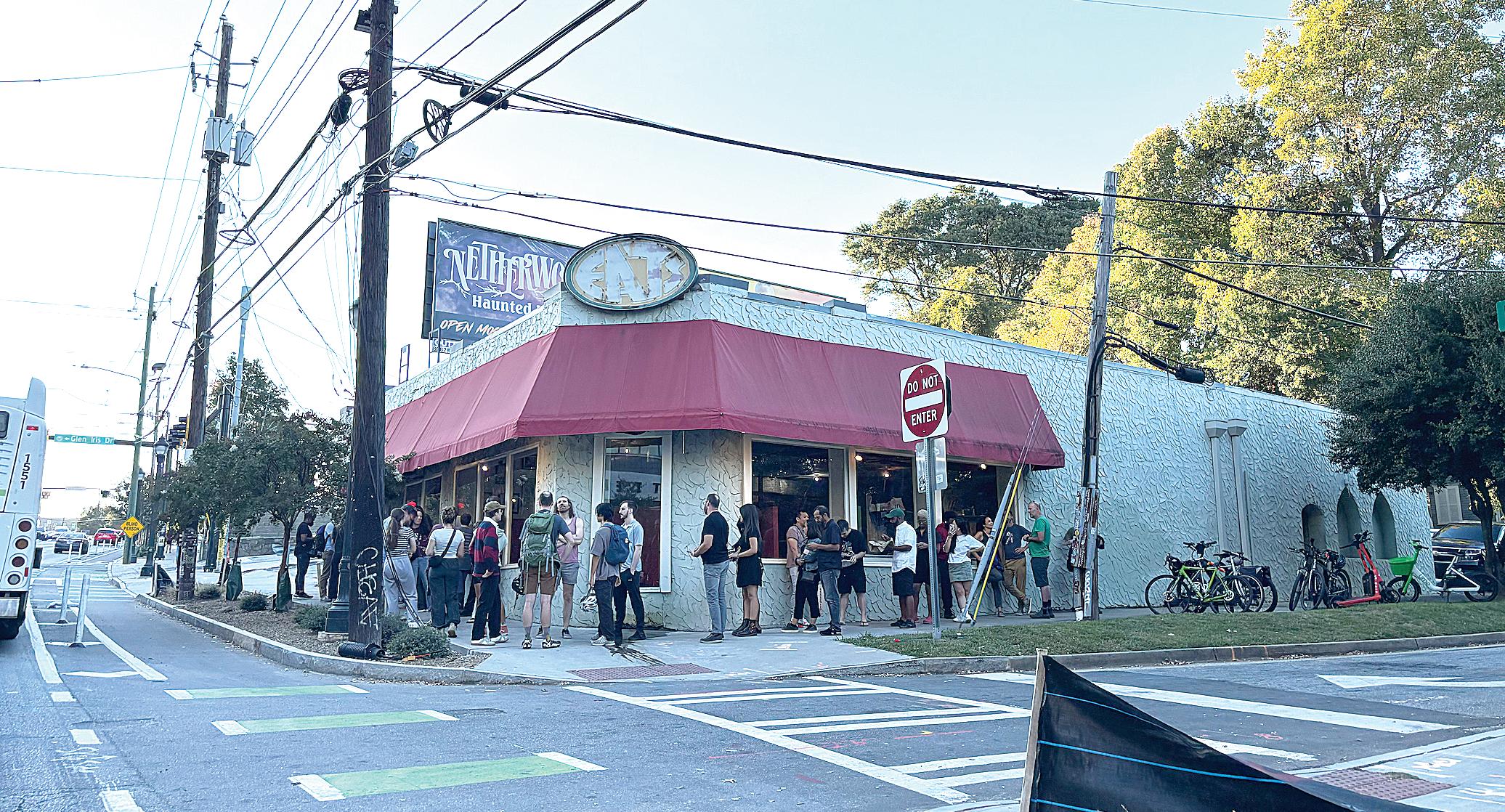
By Beth McKibben
Ponce de Leon Avenue institution Eats closed Oct. 18 after 33 years of serving up jerk chicken, veggies, and pasta bowls.
The restaurant announced its closure on Oct. 3 in an Instagram post. Reporting by the Atlanta Journal-Constitution indicated the restaurant continued to lose money after the pandemic. The situation worsened in 2023, with multiple nearby construction projects mucking up traffic along Ponce, leading to a drop-off in customers.
Located on the edge of Midtown across from Ponce City Market, Eats was known for its affordable menu of comfort food dishes, including jerk chicken plates, Southern-style vegetables, and pastas like chicken Alfredo and spaghetti and meatballs.
Bob Hatcher and Charlie Kerns opened Eats in a former swingers club in 1993, offering Atlantans of all stripes a place to gather for meat-and-three meals and pasta dinners at an affordable price point. There was a $10 special on the menu that included a meat, rice and beans, and cornbread.
After parting ways with Kerns, Hatcher took full ownership of Eats and purchased the restaurant’s building in 1998. Kerns


also owns The Local just up the street from Eats, and owned burrito joint Tortillas, which he closed in 2003.
The closure of Eats becomes the latest in a string of recent restaurant closures along Ponce de Leon Avenue east from Glen Iris Drive to North Highland Avenue.
Longtime Ponce restaurants Bookhouse Pub and Java Jive closed at the end of 2024. Bookhouse Pub opened in 2008, while Java Jive opened on Ponce in 1994.
Sports bar Dugan’s, known for its wings, closed in 2022 after 37 years on Ponce. It relocated to Tucker near Northlake Mall in 2023. The former Dugan’s property on Ponce is now home to a Chick-fil-A.
Popular neighborhood bar and wings spot The Local gave people a scare in 2023 when it appeared the property would be sold to Portman Holdings for redevelopment. That changed weeks later after Portman Holdings scaled back plans to purchase The Local property.
Major redevelopment continues, however, up and down Ponce, from Midtown to Poncey-Highland. This includes a number of new restaurants, boutique hotels, and retail shops spurred on by the Eastside Beltline and the opening of Ponce City Market.





Lines were around the block for Eats’ final week. (Photo by Jacob Nguyen)
Will the Northwest Beltline boost Westside Atlanta restaurants?
By Sarra Sedghi
On Aug. 19, Mayor Andre Dickens smashed a magnum bottle of 404 Atlanta Lager against Monday Night Brewing’s newest taproom called “The Grove.” The revamped brewery space is more than eager to accept guests, with a two-story taproom, multiple patios, an in-house pizzeria, and an adjacent, forested area that will eventually host a recreational space dubbed “Camp Monday Night.”
The Grove signifies the degree of progress the Northwest Beltline can bring to Atlanta’s northwest neighborhoods.
The Trabert Avenue building, once the “bonus property” of Myers Carpet, sits directly behind the newest segment of the Northwest Beltline near Howell Mill Road and the Atlanta Waterworks. While new bike lanes, upgraded sidewalks, and the Westside Beltline Connector have helped improve the area’s cycling and pedestrian infrastructure in recent years, there’s still more work to be done.
When Monday Night Brewing first opened in 2013 on the edge of Berkeley Park on Atlanta’s west side, the potential Beltline traffic was the last thing on the minds of Jonathan Baker, Jeff Heck, and Joel Iverson. The brewery owners chose the Trabert Avenue location because they could walk there from their homes.
At a time when Georgia’s brewery laws restricted on-site beer sales and limited Monday Night to production only, the industrial makeup of the surrounding neighborhoods worked.
“Back then, Trabert was a dead end [street],” Iverson said.
But just south of Monday Night Brewing, developers had begun enacting the initial vision for the area that would become known as “West Midtown.”
For developers, the industrial landscape rooted in the railroad had the space to usher in new developments. Chef Anne Quatrano’s Bacchanalia relocated to Westside Provisions District from Buckhead in 1999, and restaurateurs like Chef Ford Fry and Steven Satterfield followed suit in the latter aughts. This portion of Howell Mill Road, along with Huff Road, Marietta Street Artery, and Brady Avenue, felt latent with possibility.
“It seems like West Midtown was a beacon for galleries, retail, [and] nightlife,” Satterfield said of choosing to open Miller Union on Brady Avenue in 2009. “As things continued to open, it was a really exciting time. From 2010 to 2015 … it felt edgy and cool.”
As Georgia’s beer laws changed and Monday Night Brewing grew into a more customer-facing business, the Westside blossomed. Beltline officials took notice, approaching Baker, Heck, and Iverson about their brewery becoming an anchor tenant for the northwest quadrant of the trail.
“They said, ‘Hey, we would love to

figure out a way to come down to Trabert and through here,’” Iverson recalled.
In addition to serving as an anchor, Monday Night Brewing’s property also granted the Northwest Beltline a shortcut.
In 2023, Monday Night Brewing’s owners partnered with The Atlantic Companies to buy and develop a former warehouse and a kudzu-covered bonus building on the Meyers Carpet property on Trabert Avenue.
Iverson said the property, now part of Monday Night’s new Grove taproom complex, became the “critical linchpin” for getting the Beltline across Northside Drive and accessing neighborhoods to the east, like Loring Heights, Atlantic Station, and Home Park.
“The city owns the whole land on Trabert right against the waterworks,” Iverson said. “By cutting through the old Myers Carpet and then crossing Northside Drive, they were able to get across Northside and then cut through the Atlanta Technology Center.”
Monday Night Brewing isn’t the only business banking on more foot traffic with the Northwest Beltline’s completion. The owners of neighboring cafe The Daily intentionally opened on Trabert Avenue in 2022 because of the building’s proximity to the future Northwest Beltline trail.
“We anticipated that the Beltline was going to come in and the only two logical places were where the train tracks are or right across the street,” said Michael Shemtov, who owns The Daily with Jacob Hunter and Melody Shemtov, his wife.
“Once the Beltline comes, it’ll become a destination that will sort of feel like a secret when you’re here,” Melody Shemtov said. “Atlanta lends itself to that because the roads are not on a grid and there’s little neighborhoods and secret cutthroughs and back entrances and things like that down here. It’s hard not to see the possibilities when you see the Beltline thriving over by Cabbagetown and [Krog Street Market.]”
But Westside restaurateurs farther from
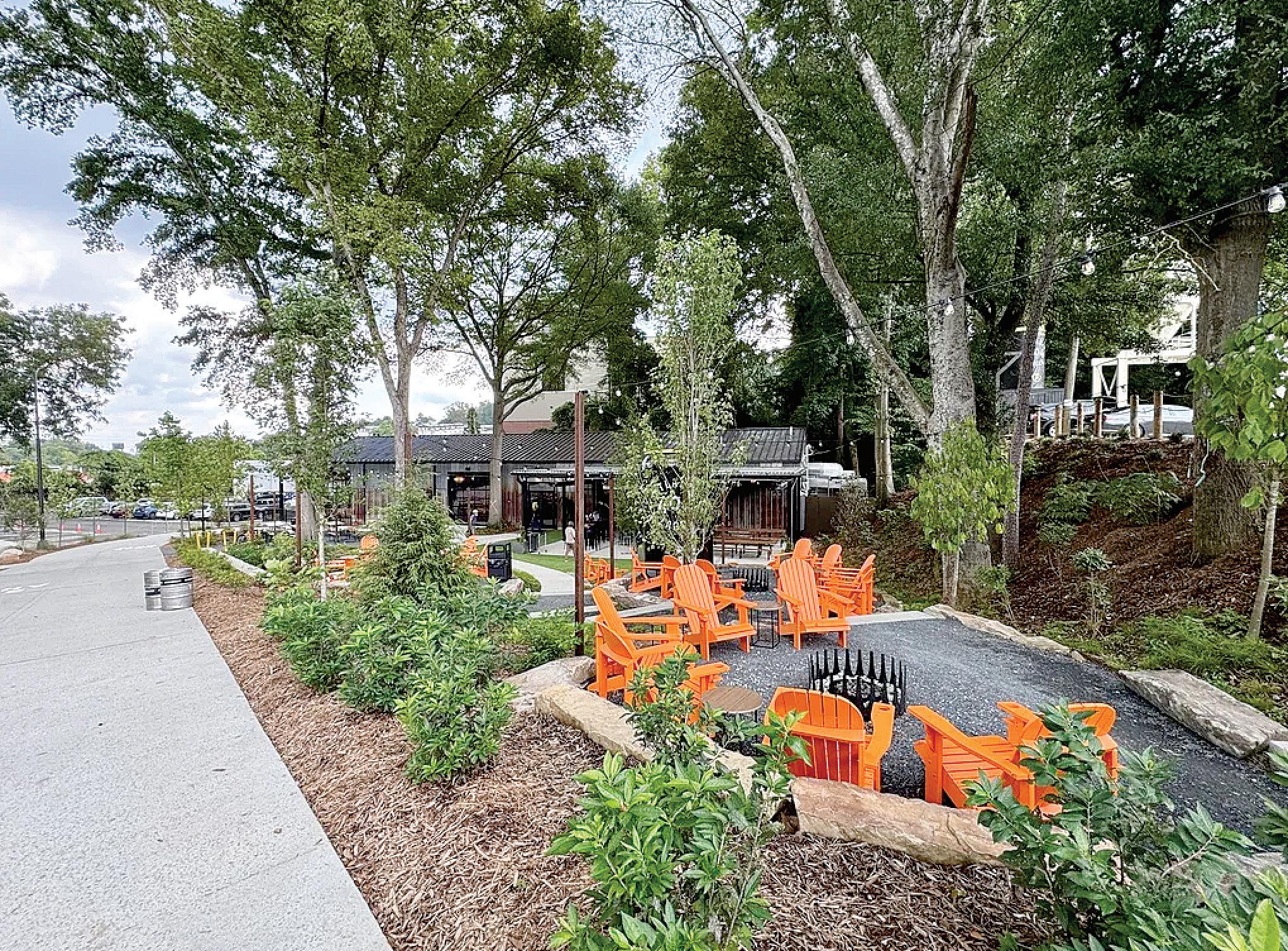
the Northwest Beltline, like Satterfield and Urban Grind owner Cassandra Ingram, aren’t so sure they’ll see a boost in business or foot traffic from a completed trail.
“It may encourage people to walk or take a scooter or ride bikes,” Satterfield said. “The majority of our customers wouldn’t be doing that for an evening out at Miller Union, but I think it’s great for the neighborhood, in general.”
Despite numerous restaurant closures over the last three years, Satterfield notes that many of the area’s original restaurants are still open, nearly two decades later. Ten-year leases were just renewed for Marcel at Westside Provisions District and Cooks & Soldiers across the street. Since the pandemic, most of the restaurant closures, give or take a few exceptions like West Egg Cafe and Bartaco, were newer to the neighborhood.
Ingram, whose coffee shop is a little more than two miles from The Grove on the Marietta Street Artery, hopes the completed Northwest Beltline will prove her skepticism about the trail wrong. And while there’s potential for growth with a completed trail, Ingram and Satterfield feel that continued infrastructural development, like adding Beltline rail, would have an even stronger impact on area restaurants and businesses.
“I’m a big fan and supporter of the Beltline, and also of the Beltline rail, for what it’s worth,” Satterfield said. “I think if there was rail, it would make a big difference for everybody.”
Changing people’s perception of the Westside, Satterfield and Ingram believe, will also help its restaurants and businesses regain some momentum. Reporting and social media posts this year on the area’s traffic problems, high parking fees, and public transit issues have left some Westside businesses and restaurants grappling with declines in sales and patrons.
Over the summer, Satterfield and other Westside restaurateurs, including Fry, Quatrano, the Castellucci family, who owns Cooks & Soldiers and Mujō on Howell Mill Road, and Justin Amick, who co-owns Painted Duck on Brady Avenue, formed a coalition dedicated to improving the neighborhood’s image.
The group is currently working with the Upper Westside CID, brainstorming ideas to help draw patrons to multiple businesses within the same week. (Think a bingo card that groups culinary experiences together to highlight all the talent in the neighborhood, or events similar to Westside Stride, which Satterfield called “a great beacon for the neighborhood.”)
“We’re working on some great ideas to present to the general public in the coming months,” Satterfield said of the restaurant coalition.
Courtesy The Daily
A newly opened portion of the Northwest Beltline runs by Monday Night Brewing in Berkeley Park. (Courtesy Monday Night Brewing)
By Beth McKibben
A second location of Virginia-Highland butcher shop and market Kinship will open at the Beacon in Grant Park next fall.
Kinship will take over an unoccupied retail spot next door to the former Elsewhere Brewing, which closed last year at the Grant Park complex.
The expansion into Grant Park will triple Kinship’s operation, allowing owners Chef Myles Moody and Rachael Pack to build upon its whole-animal butchery production, add a seafood butchery program, and provide more room to stock market shelves with seasonal produce, wine, and local pantry goods.
Most significantly, however, the Grant Park location will include a full-service cafe serving breakfast, lunch, and dinner and a bar offering beer, wines by the glass, and cocktails. (In Virginia-Highland, Kinship has become known for its breakfast sandwiches.) Moody’s brother, Connan, owns and operates Academy Coffee at Kinship and will oversee both coffee and cocktails in Grant Park.
For Moody and his brother, Grant Park is familiar territory, having grown up in neighboring Ormewood Park to the east. Five generations of their family have also lived in Ormewood Park.
Moody and Pack, who are married and now live in Ormewood Park, said they’re banking on foot traffic at the Beacon from the surrounding neighborhoods and the
Southside Beltline.
“This is another hub of community. We walk the Beltline all the time through the neighborhood. It’s how we spend our free time,” Pack said. “We are really excited to dive into another neighborhood and another creative community.”
With a full kitchen and an a.m. prep team, the cafe at Kinship will open early in the morning for breakfast and coffee. Expect a similar menu of breakfast sandwiches here from Moody and his team, along with sides of hash browns and granola and yogurt with seasonal fruits and berries.
Lunch will begin around 11 a.m., with seasonal salads and sandwiches, before shifting to heartier fare later in the afternoon. Dinner will showcase meats and seafood from the butcher counter at Kinship. Expect a menu of around 12 a la carte dishes, including starters and oysters, seasonal vegetables and mains of fish and meat, and a small selection of desserts. The bar will open at lunchtime, with Connan Moody creating a tight list of cocktails. Most of Kinship’s seating in Grant Park will be outside on the covered patio.
Moody gets excited when he talks about the butchery program at Kinship, especially the potential for growth in Grant Park.
The new location will feature a cutting room, something Kinship lacks in Virginia-Highland. Having more space for curing and sausage production, hanging

racks, and whole-animal breakdown, means Moody can install a proper roasting oven and steam kettle for making stocks and soup broths.
New to Kinship, the Grant Park location will feature seafood butchery. Moody will continue Kinship’s dedication to sustainability and zero waste through its




seafood offerings at the Beacon. “We’ll source seafood predominantly from the Southeast, whether that be the Atlantic – Brunswick or Savannah in Georgia – or the Gulf of Mexico – Florida and Alabama,” Moody said. “It’s about
Continued on page 26


Photos © Salvo Emma - Soprintendenza del Mare; ©Archivio Fotografico Soprintendenza del Mare
Chef Myles Moody and Rachael Pack. (Courtesy of Kathryn Ann Waller)
educating people [on using different parts of fish], like the cheeks of a fish are edible or utilizing the bones to make stock or fish sauce.”
To start, Kinship will open Wednesday through Sunday in Grant Park. Hours will eventually expand to six days a week. Kinship will maintain that schedule for at least a year before opening daily, giving the couple and their staff time to adjust to running two locations and to understand the wants and needs of the neighborhood.
Events like barbecues, Fourth of July
through the end of the year. After December, k|n will go on hiatus for the entirety of January. Moody and Pack plan to do a complete post-mortem on k|n and explore how to fine-tune the dinner experience in the future.
But, they don’t foresee launching k|n in Grant Park.
“The question really becomes how far, how big we go [with k|n],” said Moody. “I would love to have a fine restaurant some day, given my background, but that’s a lot easier said than done.”
Moody previously worked for Chef Linton Hopkins (Holeman & Finch, Restaurant Eugene), as well as at Eleven Madison Park, Atera, and Aska in New York City. Pack worked as a food writer, then as a sommelier at the Beatrice Inn. She later worked as the beverage manager at Aska, where she met Moody.
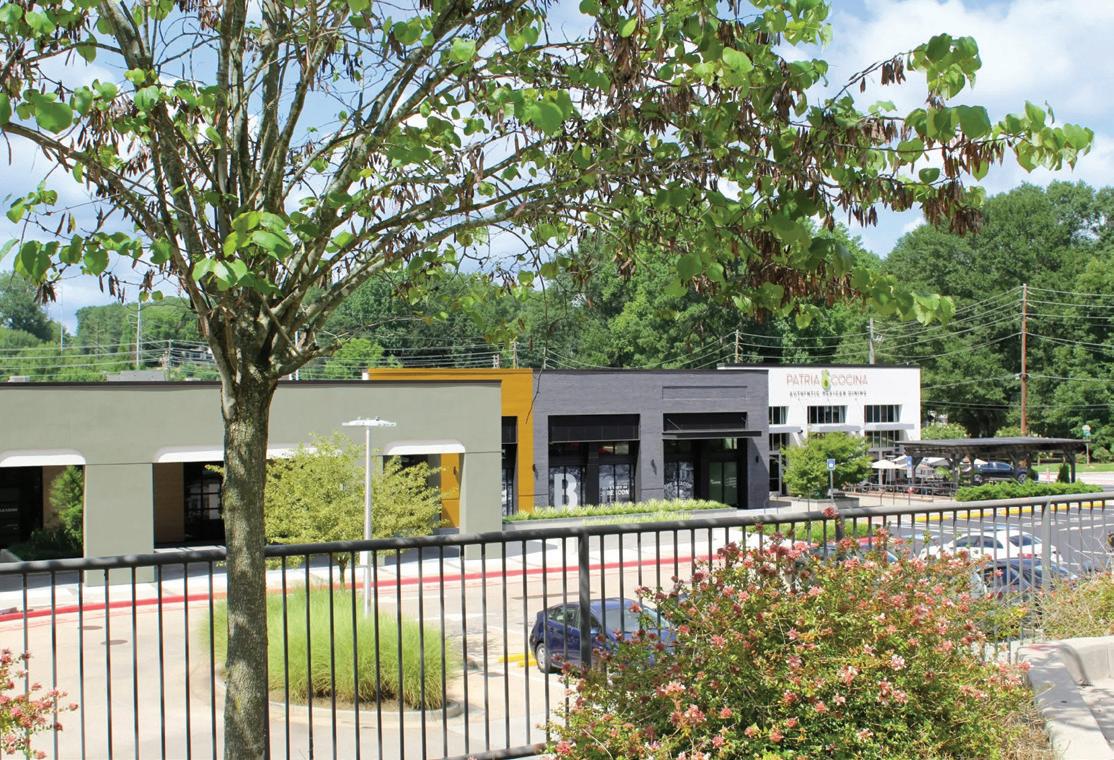
cookouts, and wine tastings, which Pack describes as more of a party atmosphere in Virginia-Highland, will play a big part in the community engagement aspect at Kinship in Grant Park.
“We want our neighbors to support us just as much as we want to support them,” Pack said.
This summer, Moody and Pack debuted a twice-monthly, chef's counter pop-up in Virginia-Highland. Called k|n, the four-seat, 12-course tasting menu, led by Moody, provides people an intimate dinner experience with wine pairings from Pack. It’s a chance to meet and converse more personally with their customers, Moody said, while showcasing the mission behind what they do every day at Kinship.
Reservations booked up quickly
The couple struck out on their own in 2021, opening Kinship Butcher & Sundry in the renovated VA-HI building, also home to Paolo’s Gelato and Pielands Pizza and Subs.
Other than splitting their time between two Kinship locations next fall, Moody and Pack said little will change at the shop in Virginia-Highland.
“We’re committed to exceptionalism in both spaces and we’ve cultivated a great team, some of whom have been with us since we opened the original location,” Moody said, noting that Kinship’s main butcher has been with them since the beginning.
“A lot of our team will stay on at the original location and some of them will straddle both locations and some of them might move to the second location.”
Kinship Butcher & Sundry will open in the fall of 2026 at 1039 Grant St., Grant Park.




Spring Quarter’s first

By Sarra Sedghi
Midtown development Spring Quarter welcomed its first two restaurants in October: Chef Fuyuhiko Ito’s (Umi, MF Buckhead) Celestia, a cocktail bar and lounge, and ISHIN, an adjacent omakase counter.
Celestia’s current menu focuses on “contemporary international” cuisine, including dishes like wagyu ravioli, oysters and caviar, and lobster. ISHIN, a 16-seat omakase counter, offers two seatings, starting at 5:30 p.m., five nights a week. Here, you’ll find a chef’s choice selection of nigiri, crudo, and yakizakana (grilled fish).
Located on the 8th floor of the Ten Twenty Spring office tower on Spring Street, expect sake, wine, and cocktails at both Celestia and ISHIN.
“ISHIN and Celestia represent a culinary journey of the places I’ve been, the flavors I’ve tasted and the unique moments that were found along the way,” Ito said in a press release. “We look forward to inviting Atlanta to take a bite and a sip with us and discover this new dining experience for Atlanta, which will soon be followed by the opening of our flagship restaurant, Sozou.”
Ito plans to open the more casual Sozou
on the ground floor of Ten Twenty Spring some time in early 2026, which will feature a robata grill and sushi counter.
Spring Quarter’s upcoming restaurants include Habaneros, Japanese restaurant Sozou, Pataaka, and possibly a restaurant curated by Steve Palmer (Indigo Hospitality Group) located inside the renovated H.M. Patterson & Son-Spring Hill Chapel. The City of Atlanta declared the H.M. Patterson & Son-Spring Hill Chapel a historic landmark in 2018.
Palmer announced in 2023 that he would bring a “morning-to-night [food and beverage] destination” to the nearly century-old H.M. Patterson building. While Atlanta-based developer Portman Holdings preserved the historic funeral home and mortuary, providing additional entertainment amenities for Spring Quarter, Palmer and Indigo Road are not listed on the website and were not mentioned in the press release.
“Portman looks forward to announcing more details about the concept and plans for The Patterson soon,” a representative for Spring Quarter told Rough Draft when asked about Palmer’s restaurant.
Portman Holdings first broke ground on the Spring Quarter complex in 2022. Spring Quarter currently houses the Ten Twenty Spring office tower and Sora, a luxury residential community with a sauna, multiple fitness centers, a pool, and ground-floor retail like Pepper Boxing.





1020 Spring Street, Midtown. Celestia open Monday – Saturday, 5 p.m. to 12 a.m. ISHIN open Tuesday – Saturday for seatings at 5:30 p.m. and 8:30 p.m. Reservations required for Celestia and ISHIN via OpenTable.com.
Kinship will reside in a 4,000-square-foot space in the green building at the Beacon. (Courtesy The Beacon)
Celestia’s rooftop lounge. (Photo by Adrian Profumo)
Celestia’s interior. (Photo by Adrian Profumo)
Help write Atlanta dining history!
Introducing the Rough Draft Atlanta inaugural Readers' Choice Awards for Best New Restaurants of 2025. Let your voice be heard!
• Restaurants must have opened between Oct. 1, 2024 and Oct. 1, 2025.
• Must be in or adjacent to Rough Draft's major coverage areas, including the cities of Atlanta, Brookhaven, Tucker, Sandy Springs, and Dunwoody.
Scan the QR code to submit your votes by November 21.



EDDIE Awards bolster entrepreneurs with disabilities
By Sarra Sedghi
Synergies Work, a nonprofit organization that bolsters entrepreneurs with disabilities, held its third annual EDDIE Awards ceremony recently at Cobb Energy Performing Arts Center.
Fifteen finalists in five categories were selected from hundreds of applicants across the country. In addition to a winner in each category, one entrepreneur was awarded “Entrepreneur of the Year” and a $10,000 grant to further their business. Synergies also announced a Lifetime Achievement award-winner.
The winners:
Lifetime Achievement: Ambassador
Andrew J. Young
Techpreneur: Rebecca Rosenberg, ReBokeh Vision Technologies
Creativity: Alexandra Adlawan, Amazing Artist LLC
Social Impact: Russell Lehmann, Russell Lehmann
Community Champion: Fernando Olivarez, Speak 4 Hope
Newcomer: Marissa Ditkowsky, National Disabled Legal Professionals Association
Rebecca Rosenberg and ReBokeh Vision Technologies took the “Entrepreneur of the Year” award. The company provides more than 115 countries — and several Atlanta

institutions, including the Fernbank Museum and the Georgia Aquarium — with tools that enhance and support functional vision.
“I had always really felt left out of the disability conversation. I have low vision that really is quite invisible most of the time,” Rosenberg said. “I really felt for so long there was nothing in terms of accessibility that was really available to me … I got to college and said, [there has] to be a better way to do this.”
In addition to a cocktail hour and seated dinner, the awards included performances by Deshaymond Solomon, a finalist, and Dom Kelly, who has performed with the Indigo Girls, and music by DJ Enman “Small Eyez” Twe. There was also a silent auction, and

speeches by Aarti Sahgal, Synergies Work founder and CEO; Maria Town, President and CEO of American Association of People with Disabilities; and Steven Braskamp, Executive Vice President of Financial Services at Capital One. Former “Good Day Atlanta” host Karen Graham emceed the event.
People with disabilities were at the forefront of the event, speaking, performing, and announcing the winners.
Veteran Georgia lobbyists launch new firm
By Rough Draft Staff
Georgia lobbyists Helen Sloat, George Ray, and Stan Jones have launched their own firm, Gold Dome Partners.
The trio, best known for their widely read “Gold Dome Report,” leaves national law firm Nelson Mullins to found Gold Dome Partners, a boutique firm that will focus on state and local government relations.
“We are excited to launch Gold Dome Partners and continue to provide our clients with the strategic, informed, and responsive government relations services that they are accustomed to,” Sloat said in a statement. She will lead the new firm with Ray, while Jones will serve as senior advisor to the firm and its clients.
According to a press release, Sloat, Ray, and Jones bring 100 years of combined experience to Gold Dome Partners. Each is regularly recognized as a Top Georgia Lobbyist by JAMES Magazine, and Sloat and Jones have been inducted into the publication’s Lobbyist Hall of Fame. Ray was named to Georgia Trend’s elite 40 Under 40 list in 2024. Together,

the team built the Georgia Government Relations practice at Nelson Mullins, which earned the firm honors as a top lobbying shop in the state. Their Gold Dome Report, pioneered by Sloat and published daily during the legislative session, is one of the most circulated newsletters among Georgia politicos.
“We are grateful for our time at Nelson Mullins, but Gold Dome Partners will provide a platform for us to grow our team and offerings to enhance how we can help

clients achieve their policy goals,” said Ray. “Our clients won’t just get the same personalized service they already enjoy— they’ll get more.”
The new firm will offer comprehensive government relations services, including legislative advocacy and analysis, regulatory affairs, coalition building, and strategic counsel to businesses, associations, and nonprofit organizations in Georgia. Sloat, Ray, and Jones represent clients across various industries, possessing deep
Multiple television screens provided closed captions and amplified a live ASL interpreter, and several speakers gave live image descriptions. The venue provided ramps and a sensory break room.
“It is not just a party,” Sahgal said. “This is the first time somebody has thought about founders with disabilities. When we invest in margins, the center grows.”

experience in appropriations, healthcare, child welfare, education, and judicial issues.
The team will also continue its tradition of pro bono work, representing meaningful causes under the new mantle.
“We have long prided ourselves on selectively working on good issues for great clients, and that won’t change,” said Jones.
“It’s who we are.”
For more information, contact George Ray at george.ray@gold-dome-partners.com.
Rebecca Rosenberg
Maria Town, President and CEO of the American Association of People with Disabilities, served as a keynote speaker. (Photo by Sarra Sedghi)
Stan Jones
George Ray
Helen Sloat
Buckhead Coalition and CID name Katharine Kelley
By Rough Draft Staff
The Buckhead Coalition and Buckhead Community Improvement District (CID) announced that Katharine Kelley, an Atlanta-based urban development and civic leader, will take the helm as CEO of both organizations starting January 2026.
Drawing from her 30-year career in urban development and community leadership, Kelley will oversee collaborative initiatives aimed at strengthening Buckhead’s infrastructure and quality of life, while cultivating strategic relationships with stakeholders across metro Atlanta, according to a press release.
“I am thrilled to step into this leadership role with two organizations so committed to Buckhead’s progress and vitality. As a Buckhead native and resident, my DNA is rooted in this community,” Kelley said in
a statement. “Buckhead is poised to play a great role in Atlanta’s future, and I’m excited to work alongside our Coalition members, the Buckhead CID board, civic partners, and residents to drive growth that benefits both our community and the broader metro Atlanta region.”
Kelley, who will step down as President of Green Street Properties, has led the development of more than $2 billion of properties while serving in senior positions at Jamestown, Post Properties, Newport, and Green Street. Her work includes Ponce City Market, South Downtown, Post Riverside (now MAA Riverside), and Glenwood Park. She currently serves on the board of directors of Invesco Mortgage Capital, Inc.
Kelley is a graduate of The Westminster Schools and holds a BA from UNC as a Morehead Scholar, a Master's in Real Estate
Development from Columbia, where she wrote her thesis on community improvement districts, and an MBA from Harvard.
Kelley also previously served as President of the Rotary Club of Atlanta, as a member of the City of Atlanta Zoning Review Board, and is the immediate past Chair of the Board of Trustees of The Westminster Schools. She is also the 2023 recipient of the Atlanta Urban Land Institute (ULI) ChangeMakers Award.
Kelley succeeds Jim Durrett, a long-time Atlanta civic and transit leader, who will retire in early 2026



Katharine Kelley (Photo by Julian Alexander)
Student tower planned for Cheetah Lounge property

By Collin Kelley
The Midtown Development Review Committee (DRC) reviewed a redevelopment plan for a student high-rise proposed for the Cheetah Lounge property at its Oct. 14 meeting.
Developer Core Spaces wants to build the 27-story tower at 887 Spring St., which has been the home of the Cheetah Lounge strip club for nearly 40 years.
The student-focused tower would contain 532 units including 1,407 bedrooms and 6,527 square feet of
Condo sales at Elyse Buckhead begin ahead of 2026 groundbreaking
By Rough Draft Staff
Real estate development firm
Kolter Urban has begun pre-sales at its new luxury condo project, Elyse Buckhead, which is set to break ground in 2026.
The 20-story building at 102 West Paces Ferry Road will offer 194 condos priced from the mid-$900,000s, according to a press release. Atlanta Fine Homes Sotheby’s International Realty is marketing the property and has opened a sales gallery at 107 West Paces Ferry Road, Suite 200.

Elyse Buckhead marks Kolter Urban’s third project in the district following The Dillon Buckhead and Graydon Buckhead.
Designed by Rule Joy Trammel + Rubio Architects, the condos will feature one- to three-bedroom residences with private terraces ranging from 1,200 to just over 4,000 square feet. The press release said the building will have “five floors of estate-style residences and an exclusive penthouse level.”
The property will have 63,000 square feet of resort-style amenities, including a
heated pool with private cabanas, a spa and an indoor Aqua Lounge, a pickleball court, a Sports Lounge, a Swing Sports Simulator Lounge, an intimate outdoor gathering area with an open-air kitchen and fire pit, a grand event lawn, and a dog park and pet wash station.
The lobby level will have a formal club room, a private dining room, a catering kitchen, a fitness center featuring private training rooms and a group movement studio, a theater viewing room, and a spa center for residential use only.
Find out more at elysebuckhead.com.

ground-floor retail space. There would also be a 119-space parking deck and three rooms dedicated to bicycle parking.
Current plans show an entrance-only driveway on Spring Street and a two-way driveway along 8th Street for access to back-of-house services.
Much of the DRC’s feedback related to the building’s north-facing orientation along 8th Street, including power lines, street trees, fencing, and the façade.
The DRC recommended burying power lines along 8th to improve aesthetics and allow for the planting of Southern Sugar Maple trees. The DRC also said a planned fence on 8th was prohibited by code and recommended a simple grass lawn area with low evergreen hedges.
Another recommendation was to extend the Spring Street facade to 8th Street to increase visual interest, along with some type of large artwork.
The committee also suggested increasing the capacity of bike storage, including offering space for heavy e-bikes and wider tire bikes.
The development team said approximately 19,600 square feet of the north portion of the property would be reserved for a future development phase.
Lidl opens at The Interlock

The Interlock development in West Midtown finally has a grocery store tenant.
European discount supermarket Lidl opened its doors on Oct. 22.
The 31,000 square foot ground-floor space in phase two of The Interlock was originally announced in 2021 as a Publix, but the Florida supermarket chain pulled out last year. The store will be open from 8 a.m. to 9 p.m. daily.
Lidl is known for its no-frills approach with less expensive private-label products often displayed in their original shipping cartons.
Collin Kelley
A closer look at the proposed retail space on the ground floor at 887 Spring St. (Courtesy Midtown DRC)
A rendering of the proposed student tower at 887 Spring Street. (Courtesy Midtown DRC)
Courtesy Rule Joy Trammel + Rubio Architects
Courtesy Lidl
Affordable Skyline Apartments opens on Southside Beltline
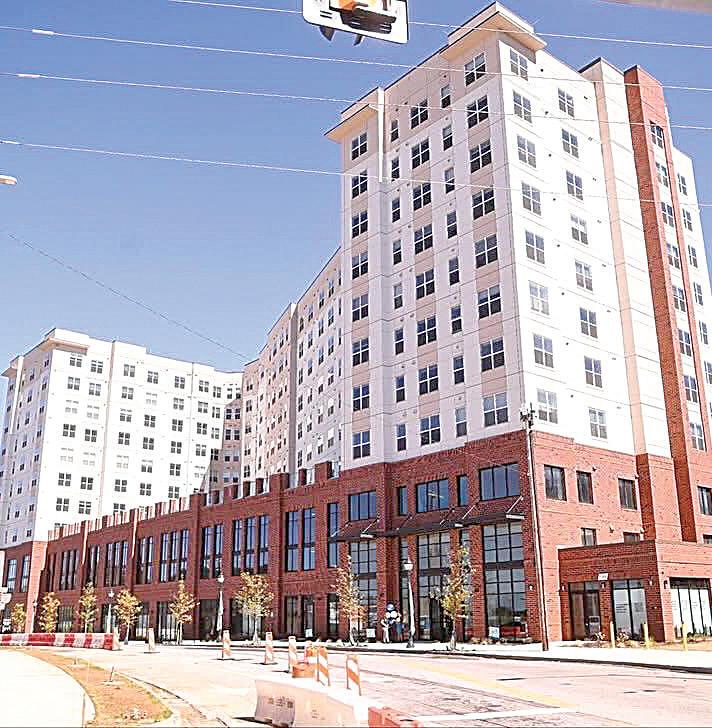
By Rough Draft Staff
Skyline Apartments, a new 250-unit apartment building developed by Exact Capital, has opened on the Southside Beltline trail in Peoplestown.
Located at 1090 Hank Aaron Drive, units at Skyline are priced for residents with incomes at or below 60% of the
area median income. There are also groundfloor retail spaces available.
“Skyline Apartments is a transformative development that delivers longterm community growth and stability for residents of one of Atlanta’s most dynamic neighborhoods,”
Craig Livingston, Managing Partner of Exact Capital, said in a statement.
The project, a joint venture between Exact Capital and Aleem Construction, broke ground in 2022.
Supported by Invest Atlanta, Goldman Sachs, Stonehenge, LISC, and Walker & Dunlop, “Skyline Apartments reflects a shared commitment to creating attainable housing for Atlantans at a time when affordability matters most,”
New apartment building debuts at Star Metals in West Midtown

By Rough Draft Staff
Stella at Star Metals, the third building at the Star Metals District in West Midtown, is now open.
Designed by Oppenheim Architecture, the 22-story building echoes the site’s warehouse heritage. Stella’s façade features a grid-like pattern of windows wrapped in luminous copper cladding. At street level, recessed corners create
a 52-foot entry that leads into a multilevel lobby. Higher up, a sky lounge offers panoramic views of Downtown Atlanta, and stepped terraces add landscaped spaces where views of the skyline and the surrounding neighborhood can also be enjoyed.
Stella houses 327 residences ranging from studios to penthouses. Amenities include a hotel-style lobby, rooftop pool and lounge, fitness facilities, a screening room, and access to curated restaurants, bars, and retail spaces. Find out more stellaatstarmetals.com.
Livingston said. “Skyline was a labor of love. It represents our commitment to building communities that provide housing security and uplift families.”
“Skyline expands affordability along the Beltline, bringing highquality housing to Peoplestown – a neighborhood that embodies the history and character of Atlanta,” Asahi Pompey, Chair of the Urban Investment Group at Goldman Sachs Alternatives, said in a statement. “This investment is more than attainable homes; it’s increased access to jobs, reliable transit, and opportunity, laying a foundation for lasting stability in the vibrant city of Atlanta,” she added.
The Urban Investment Group (UIG) at Goldman Sachs Alternatives provided
financing for the project, consisting of a construction loan and federal lowincome housing tax credit equity.
Skyline features studio, onebedroom, and two-bedroom apartments with amenities like a state-of-theart healthcare center, fitness facility, community room, meeting spaces, dog wash station, secure gated entry, and covered parking.
“More than just housing, Skyline stands as a testament to what’s possible through public private partnerships with collaboration from partners like Invest Atlanta, Goldman Sachs, Stonehenge, LISC, and Walker & Dunlop,” Lamar D. Williams, Managing Director of Exact Capital, said in a statement.

BEETHOVEN PROJECT: First Piano Concerto + Stutzmann Conducts Shostakovich’s Symphony No. 8
Stutzmann Conducts Schumann
+ Hélène Grimaud performs Brahms’ First Piano Concerto
Khachaturian Violin Concerto
+Sibelius’ Finlandia and Second Symphony

Courtesy City of Atlanta
Stella at Star Metals (Photo by Garey Gomez/Oppenheim Architecture)










